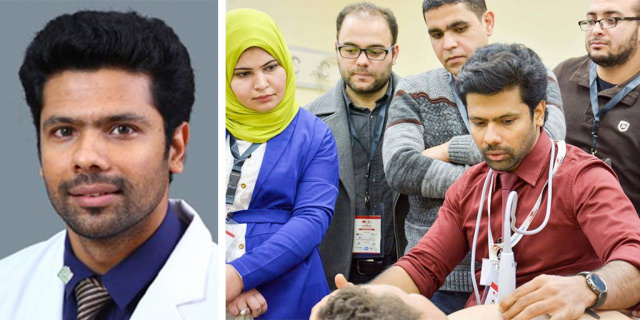

Dr. Fabith Moideen, Chief of Emergency Medicine department at Baby Memorial Hospital, Kozhikode, Kerala, India has worked for 13 years in emergency medicine. Dr. Moideen recently shared his journey with point-of-care ultrasound (POCUS) and its importance in routine clinical practise.
To begin with, my interest in POCUS started just like a gadget fever. I started using POCUS on all my patients, and eventually fell in love with it because of its contribution to challenging cases in my clinical practise. POCUS became a part of my diagnosis, improved my clinical skills, and has surely added to my confidence as a budding physician.
POCUS has been around for many years, and many doctors now rely on this boon of technology to save lives. It has become the mainstay of hospitals and is almost indispensable in emergency medicine departments because it is quick, reusable, and possesses no ionising radiation.
POCUS can lower direct and indirect costs associated with diagnostic workups, prevents the need to move a sick patient to an imaging room, aids auscultation in a noisy environment, and can help answer many clinical questions.
I have been using a FUJIFILM Sonosite M-Turbo ultrasound system in our ED for many years. Sonosite systems are easy to carry, give a great image quality, and make the learning curve easier with their user-friendly keyboard.
FUJIFILM Sonosite has been a great service provider and is the backbone of all ultrasound workshops, both nationally and internationally. The educational videos presented on their platform are highly-professional and informative. I consider myself fortunate to have grown professionally with Sonosite.
Even in these hard times of COVID-19, ultrasound can be used where resources are getting rampantly exhausted. It helps to triage the patients so we can rule out serious complications and send patients home safely for quarantine. It also has prognostic value in COVID-19 management. This Sonosite tool is compact with a fully-sanitisable console, so it is very easy to disinfect to prevent cross-contamination.
Ultrasound has played a pivotal role in many of my cases. It helped me remove a broken cannula from a vein, and I have used ultrasound for surgical cricothyroidotomy. POCUS has also helped me in an early detection of a renal mass while doing FAST exam on a trauma patient, helped me diagnose pseudo-PEA, and helped me in doing an aggressive resuscitation to save a young patient.
We often find ourselves in a gray zone when evaluating a patient with breathing difficulty, chest pain, or abdominal pain. We have included POCUS extensively in our practise for management of most of these emergencies.
Portable ultrasound is the future of clinical medicine. Every doctor must learn how to use it. I strongly recommend the introduction of POCUS to the academic curriculum at the MBBS [undergraduate medical degree] or equivalent level. It must also be made mandatory for residents of all clinical specialties.
I hope to continue my journey with FUJIFILM Sonosite and take POCUS to another level.
